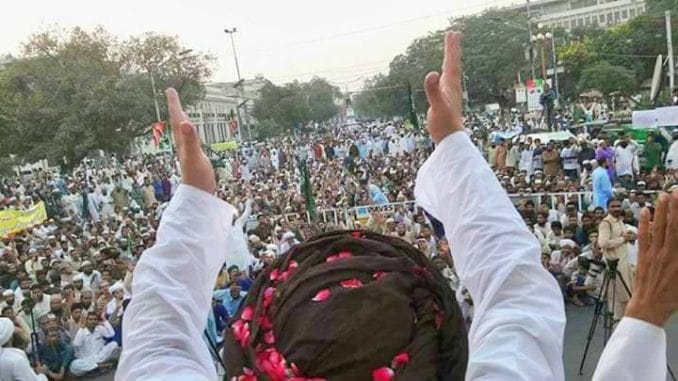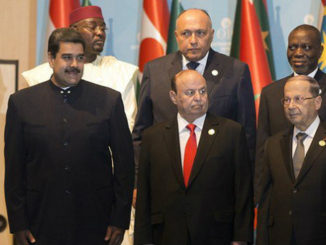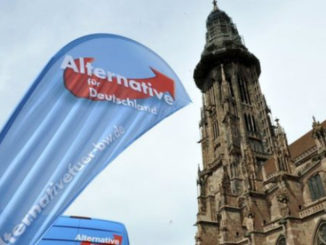
Mohsin Choudhry/The Santiago Times Publisher
LAHORE – Pakistani Islamists who brought traffic in major cities to a standstill on Thursday have temporarily called off national protests after a long round of negotiations with the government of Punjab province.
Life in Lahore, the most populous city of the South Asian country, became virtually paralyzed when Khadim Hussain Rizvi of Tehreek-i-Labbaik Pakistan (TLP) ordered his workers to “come out on streets” after days of government’s silence.
The 51-year-old cleric is leading the religio-political party that backs strict blasphemy laws in one of the world’s most dangerous countries for religious minorities. Christians, Hindus, Sikhs, Buddhists and others make up around 3 percent of Pakistan – the sixth most populous state in the world. Pakistan has the second largest number of Muslims in the world after Indonesia.
Following Rizvi’s call, thousands of protesters easily managed to took control of key entry and exit points of the Punjab capital city, blocking all kinds of vehicular movement on major highways.
Within few hours, the city’s arteries were choked Thursday evening as the protests starting from the shrine of famous Sufi saint Data Ganja Baksh spread nationwide.

Demonstrations were held in Sialkot, Sahiwal, Gujranwala, Kasur, Multan, Faisalabad, Rawalpindi, and Peshawar amid heightened security in capital Islamabad, where the same protesters had staged a sit-in last November which ended after the country’s law minister was forced to resign in the wake of a controversial amendment made in Elections act.
Zahid Hamid of the ruling Pakistan Muslim League was accused by the protesters of blasphemy after a reference to the Prophet Muhammad was left out of a revised version of the electoral oath. He called it a clerical error. The protesters in turn agreed not to issue a fatwa, or Islamic religious ruling, against the minister.
The tense situation, however, turned normal by Friday morning after the authorities agreed to fulfill the terms of the so-called ‘Faizabad agreement’ that was brokered by the country’s military last year.
One of the TLP demands is that a report prepared by a senator-led commission be made public.
The political faction of Tehreek-e-Labbaik Ya Rasool Allah (TLYRA), seeks public support for Section 295-C of the Pakistan Penal Code, which deals with blasphemy committed against the Islamic Prophet.
Its founder, Khadim Rizvi who has been confined to a wheelchair since 2006 ever since an accident, earlier continued to raise his voice for the release of Mumtaz Qadri – the elite police commando who gunned down former Punjab Governor Salmaan Taseer in Islamabad’s uptown market in January 2011.
Qadri was hanged after being found guilty of Taseer’s murder. Since then, his grave has turned into a shrine for those who agree with his position on Pakistan’s blasphemy laws.
Anti-blasphemy laws continue to be controversial in Pakistan. Rights groups say they have often been abused to settle personal vendettas and disputes. Due process is often ceremonial and decisions are often informed by the growing religious intolerance in the country. Even if courts do drop charges against defendants, mobs and local residents attack them.
A staunch follower of Imam Ahmed Raza Khan Barelvi, the 19th century founder of the Barelvi sect of Islam, Khadim Rizvi made his first entry into mainstream politics in the by-polls of NA120, the elected constituency of former prime minister Nawaz Sharif which fell vacant after his disqualification amid Panama Papers investigations.

After Friday’s episode, the civilian government – which is still led by Sharif’s party – is once again being criticized for backing down in the crisis, which also raises new questions about the hardline pressure on the political establishment currently engaged in infighting ahead of 2018 elections.
Last November, the clashes between TLP protesters and Islamabad Police left at least six people dead and some 200 injured.
Earlier this month, Rizvi and other clerics were declared proclaimed offenders in a terrorism case relating to Islamabad clashes.
Ijaz Ashrafi, a central leader of TLYR, says they will continue the protest till the government gives way on all their demands, including freeing arrested protesters and reverse changes made to blasphemy laws introduced during the dictatorial regime of General Ziaul Haq in 1986.
The government is awaiting court orders, according to provincial spokesman Malik Ahmed Khan.
Interior Minister Ahsan Iqbal, who is on a tour to China, termed TLP’s protest “pointless”, saying that such demonstrations were ruining Pakistan’s image internationally.
Many in the country, where Beijing is in a process to restore the ancient silk route in South Asia through the $46 billion China-Pakistan Economic Corridor (CPEC), believe this movement in the name of religion is further dividing Pakistani society.
While majority of people discourage the idea of using brute force against the protesters, the TLP says they “fear letting anyone disrespects the Prophet more than anything”.



